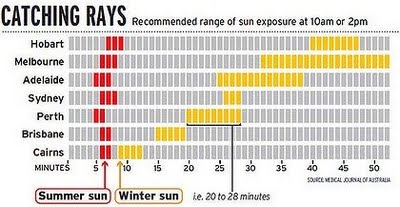http://www.nakedcapitalism.com/2009/08/guest-post-d-generation.html
In a country as dazzled by sunlight as Australia, the idea that a GP should check your vitamin D levels seems bizarre. Yet that is what some doctors are now suggesting that along with routine checks for blood pressure and cholesterol, we have a test for vitamin D deficiency, says Rebecca Mason.
http://www.brisbanetimes.com.au/lifestyle/wellbeing/vitamin-d-deficiency-linked-to-cancer-20090729-e1mg.html Vitamin D deficiency was once something most younger adults did not have to worry about at least if they were light-skinned. It was considered mainly a problem of housebound, sick or elderly people with little exposure to sunlight, of women who wear concealing clothes and people with dark skin.
But studies across all ages in different parts of Australia, including sunny Queensland and Perth, have found that some younger adults have mild to moderate deficiencies, especially if they live in cities, says Mason, professor of physiology at the Bosch Institute, University of Sydney.
The cause of what she calls an epidemic of vitamin D insufficiency is a combination of two things. One is that health experts have raised the bar of how much vitamin D is enough. The other is probably changes in the way we live that have reduced our exposure to sunlight, our main source of vitamin D.
We are not only savvier about skin protection, but we also have longer working hours; lunch breaks spent at our desks and long commutes in the confines of cars and buses all conspiring to keep us from the sun.
Vitamin D, which is really a building block for a hormone, is best known for its link to bone health without it you cannot absorb enough calcium. But the other reason why vitamin D is a hot topic is the evidence linking the lack of it to a surprisingly mixed bag of health problems. The tally so far: multiple sclerosis, Type 1 diabetes, rheumatoid arthritis, muscle weakness, high blood pressure, memory loss and even weight gain. But the strongest evidence so far is for cancer, Mason says.
The most consistent evidence links insufficient vitamin D to colon cancer, she says. Theres evidence for breast, prostate, and ovarian cancer and melanoma too, but its limited.
As for how vitamin D might help protect against cancer, some studies have shown it helps slow the proliferation of cancer cells. It may also improve the immune systems defence against some cancers and may reduce the growth of blood vessels that nourish cancer cells, she says.
More intriguing still is the idea that sunlight, the bringer of skin cancer, might also help prevent the disease, according to preliminary research at the Bosch Institute. The theory is that vitamin D compounds that accumulate in skin when it is exposed to sunlight may help reduce UV damage to the DNA of skin cells, Mason explains.
But for people who already have some forms of cancer, including colon or oesophageal cancer, healthy levels of vitamin D may influence their survival. Some studies show that the more vitamin D, the better the outcome, the professor says.
That is why the NSW Breast Cancer Institute is investigating the vitamin D levels of women newly diagnosed with breast cancer, says Kellie Bilinski, a dietitian and the project leader of the institutes vitamin D research program.
Where you live, and therefore how much sunlight you get, might also influence your risk of some diseases. Overseas studies suggest that women living furthest from the equator are more at risk of breast cancer, Bilinski says. A study by the Breast Cancer Institute is trying to find out if the latitude where a woman lives in Australia affects her chances of developing the disease.
As for multiple sclerosis, the risk is seven times higher if you live in Tasmania than if you live in tropical areas of Queensland, says Associate Professor Bruce Taylor of Hobarts Menzies Research Institute. To understand the sunlight-MS connection it helps to know that MS is an auto-immune disease one where the immune system mistakenly attacks the bodys own tissues. Researchers now believe that having sufficient vitamin D may help prevent MS by making the immune system less trigger-happy.
This may also mean that vitamin D has a role to play in other auto-immune disease such as Crohns disease, rheumatoid arthritis and Type 1 diabetes, Taylor says.
MUCH MORE AT LINKS